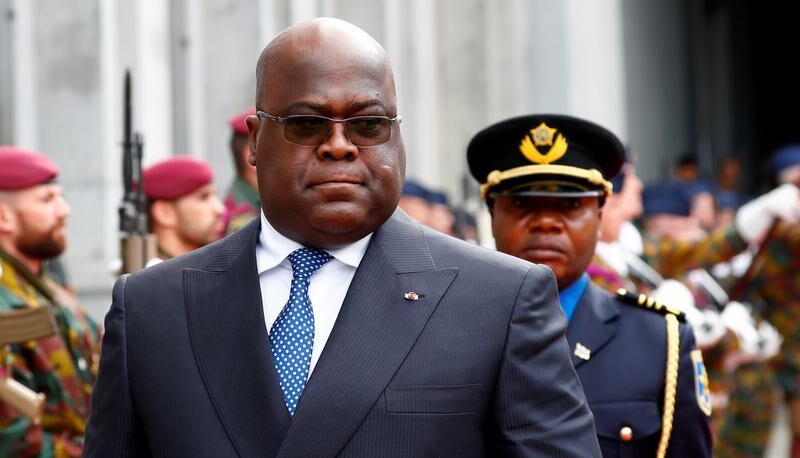Congolese president Félix Antoine Tshisekedi Tshilombo, the son of the late opposition leader, Étienne Tshisekedi wa Mulumba who served as Prime Minister of Zaire, had a comfortable life as a youth in the Congolese capital, Kinshasa.
Fast forward. In 2019, he became president of his country, now called the Democratic Republic of the Congo, or DRC, in the first peaceful transition of power in the country ever since it became independent from Belgium in 1960.
Tshisekedi Jr came to power thanks to an agreement with former president Joseph Kabila. A few months later, Fatshi Béton, as Tshisekedi is known by his supporters, refused to be a puppet of his predecessor. Analysts thought Kabila would continue to wield and retain great power in the mineral-rich country. But one by one, Tshisekedi outmanoeuvred the Kabilists, or Kabila loyalists, to consolidate his power. His success in wresting full power from his predecessor started with the sacking of Kabila’s chosen Prime Minister, Sylvestre Ilunga Ilunkamba in January 2021. Three months later, he appointed an expansive cabinet under the new Prime Minister, Sama Lukonde.
As they, the rest is history. After four years in power, Tshisekedi Jr’s focus on quick wins rather than on fixing the crisis of the Congolese state by uprooting corruption, nepotism, mismanagement, ethnicity, and an environment where no one is held to account could be his Achilles’ heel.
However, the crisis of the state in Kinshasa is not his only problem as a new round of elections looms in 2023. At a time of growing tension with neighbouring Rwanda, sources say, the Congolese president is under siege. Among others, his denial and lack of leadership has jeopardized the relationship between Rwanda and DRC.
After three years of cooperation, Rwanda and DRC are at odds over the M23 rebellion, which Kinshasa believes is supported by Kigali. The M23 rebel group resumed its attacks in November 2021 and has regularly clashed with the Congolese army, in North Kivu, since the end of March.
Tshisekedi is trapped, sources say, by army generals and especially those with strong ties to the old guard from the Mobutu era. Some of his inner circle fear that he may be assassinated. Mobutu had strong ties with the regime that perpetrated the genocide against the Tutsi in Rwanda in 1994.
Members of the former forces armées zaïroises (FAZ), the government army in Zaïre from around 1971 to 1997 during the Mobutu regime, are the main actors in what has been a strategic covert mission to smother the rapprochement between Kinshasa and Kigali. Ever since Tshisekedi came to power, they have been scheming, patiently. And, by and large, they have succeeded.
The main man behind the plot to topple Tshisekedi is none other than a soldier who the former appointed to the post of Deputy Chief of Staff in July 2020. Gen Jean-Claude Kabey Yav might pretend loyalty but he is a man with a sinister agenda.

Then there is Gen Gabriel Amisi Kumba, whose nickname is Tango Four. This former FAZ officer, it is said, could be eyeing the topmost post. The FAZ era Generals want war with Rwanda, not because they know they can win it but because they know the consequences would all be blamed on Tshisekedi. And then if Tshisekedi takes the war bait, their sinister trick is to use the FDLR – a remnant of the Rwandan Hutu Power militia responsible for the 1994 genocide against the Tutsi – in the plot to topple the government in Kigali. Some senior military officers tried to warn Tshisekedi about the danger lurking in his backyard but it seems the president is already boxed in.
While Gen Célestin Mbala Munsense, the Congolese army’s Chief of Staff, and FARDC Chief of Military Intelligence, Maj Gen Mandiangu Mbala Michel, are overtly and covertly undermining Tshisekedi, the latter appears almost powerless as they have already ensnared him. Alot is happening, so fast, around him and he doesn’t seem to know who to really trust, a situation that is recipe for disaster.
Sources indicate that after the arrest of François Beya, the former security advisor to the Congolese leader, Tshisekedi entourages isolated Fortunat Biselele, the powerful advisor to Tshisekedi. Beya was arrested on pretext that he was plotting against the President.
The death of Delphin Kahimbi, the former chief of military intelligence who was related to Joseph Kabila, also raised eyebrows. After Tshisekedi came to power, Kahimbi continued to play a central role in the army and the new president had charged him with negotiations on the conditions for the repatriation of former M23 combatants in Uganda and Rwanda.
Kahimbi led two delegations to Kigali, in July and October 2019, and another to Kampala, at the request of François Beya, Tshisekedi’s security adviser. Tshisekedi entrusted him with the mission of convincing Rwandan, Ugandan, Burundian, and Tanzanian officials to create a regional alliance against the armed groups in eastern DRC.
According to analysts, the situation is worsened by the fact that Tshisekedi is “an outsider” who enjoyed his father’s connections and became president with no inside knowledge about the DRC army. The Congolese security apparatus was created and controlled by his predecessors, beginning with Mobutu. Ignoring that fact and just assuming that the army, police, and the intelligence always remained loyal to the elected president was a blunder, sources say.
Worse still, Tshisekedi does not master issues in the east of his country and he relies on cooked reports from military generals he never pays.
In the few months remaining before the 2023 elections, Tshisekedi will need to take very difficult decisions, if he wants to salvage his tenure. The basics include the reform of the army, police, and the intelligence; the civil service; in addition to public policy-making.
thegreatlakeseye.com










